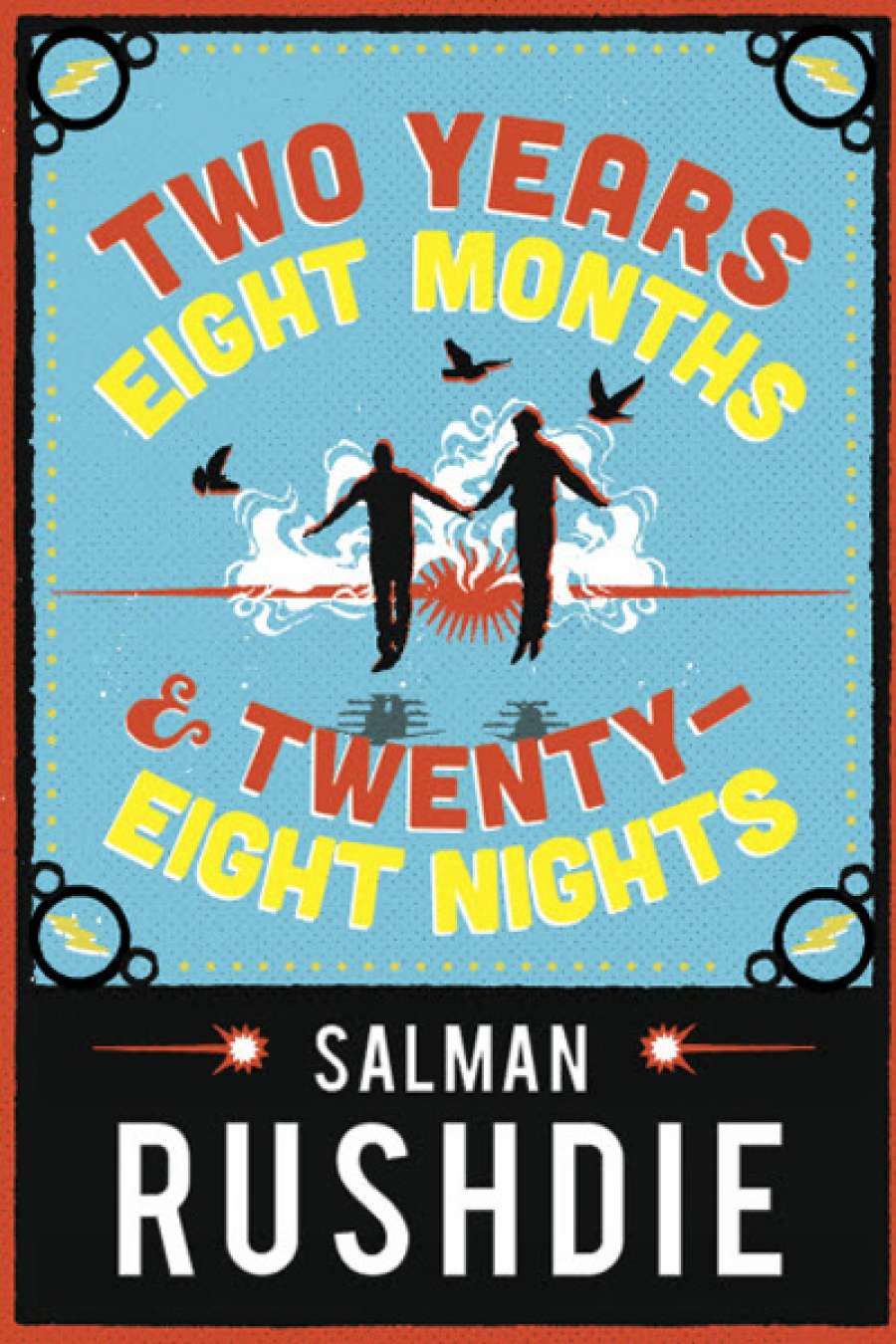
- Free Article: No
- Contents Category: Fiction
- Custom Article Title: Jane Sullivan reviews 'Two Years Eight Months and Twenty-Eight Nights' by Salman Rushdie
- Book 1 Title: Two years eight months and twenty-eight nights
- Book 1 Subtitle: a novel
- Book 1 Biblio: Jonathan Cape, $32.99 pb, 286 pp, 9781910702048
The latter phrase (referenced in the novel's title) is one of the names for Rushdie's principal inspiration, the collection of antique tales known as the Arabian Nights. He has clearly had enormous fun raiding these stories, picking up on the Scheherezade spirit of anarchy and amorality, conflict and betrayal, stories within stories and dazzling magic: all to spellbind the listener and ward off the death of the storyteller.
The breathless-paced narrative is told from a point of view in the far future, looking back first to the year 1195 and then to New York in our own age, when a time of 'strangenesses' precedes a titanic war between two clans of jinn. Yes, these are the familiar creatures that whoosh out of bottles and grant you three wishes, but Rushdie recreates their cosmos, including their insatiable lust for one another, and allows them to enter our world. One group is on humanity's side, the other aims at humanity's subjugation and destruction (although it is never so cleanly divided into goodies and baddies). A gardener finds that his feet will no longer touch the ground. A baby causes boils to break out on the skin of any deceitful person who comes near it. A mighty jinnia (female jinn), the Lightning Princess, who once loved a mortal man and gave birth to a tribe of descendants, returns to earth to seek out her progeny and to enlist them in the fight against her evil brethren.
If this sounds like a blockbuster coming to a cinema near you, it is deliberate. Rushdie revels in the ancient origins of his tales, but also in their echoes in contemporary popular culture, and he chucks in nods to The Producers, Ghostbusters, DC comic books, and adolescent crowd-pleasers. There are also 'grabs' from the news: the jinn possess humans and force them to shoot down passenger planes.
Rushdie is a dab hand at literary allusions: hands up all those who recognise the peeping Tom who spies on a lingerie goddess, is turned into a stag and pursued by phantom hounds? Or Irish people living in rubbish bins? Or the character called Casterbridge who sells his wife? This gives the story a bristling density, a Nabokovian exuberance and a chance for the canny reader to feel smug. All of which makes the book a witty and stimulating read, whether it is the intellectual or the popcorn part of the cerebellum that's being prodded.
 Salman Rushdie
Salman Rushdie
Still, I didn't always warm to this novel, perhaps because there are no human-scale characters; the principal humans all have jinn ancestry. Larger than life is fun for a while, but then you just want life. Here they come again, like so many Pokemon: Zumurrud the Great, Zabardast the Sorcerer, and Ra'im Blood-Drinker. So much flash, bang, wallop, but not very much quiet or intimacy or real feeling; the moment when, as Rushdie often tells us in his appropriation of Voltaire, it is necessary to cultivate one's garden.
'If this sounds like a blockbuster coming to a cinema near you, it is deliberate'
So if this novel were just a demonstration of the joys and compulsions of storytelling, I would be disappointed. But there is more. The jinn are hugely magnified versions of our own impulses and desires, but what also interests Rushdie is ideas, and the beginning of his story, in particular, crackles with them (pick a philosopher: Voltaire, Spinoza, Schopenhauer, etc.). They come in convenient bite-sized helpings. He sets the tone with Goya's famous etching Los Caprichos, with a sleeping man beset by nightmarish creatures, and its caption: 'Fantasy abandoned by reason produces impossible monsters: united with her, she is the mother of the arts and the origin of their marvels.' As far as I can work out, this is Rushdie's view. Possibly in a post-fatwa spirit of caution, his story is relentlessly secular – no god is invoked, there is nothing divine or diabolical going on. The hostile jinn break in on us because we are living in an age of incoherence. We need a return to reason, but reason alone can't stand up against religion: we need fantasy too.
'Writing broke away from the gods and in that rupture much of its power was lost,' Rushdie once said. I think he is trying to get that power back, and good luck to him.


Comments powered by CComment